Testimonials: Read & Listen to First-Hand Accounts of Burning Tree Alumni & Families
Discover Our Stories of Healing
We know the Burning Tree program is effective for difficult, advanced cases of addiction. We also know what we’re asking families to undertake is far from simple or easy.
The transformative results of the Burning Tree experience are best illustrated through the stories of our families who have undergone the journey firsthand.
Our alumni express the experience, strength, and hope that Burning Tree Ranch holds for the chronic relapser.
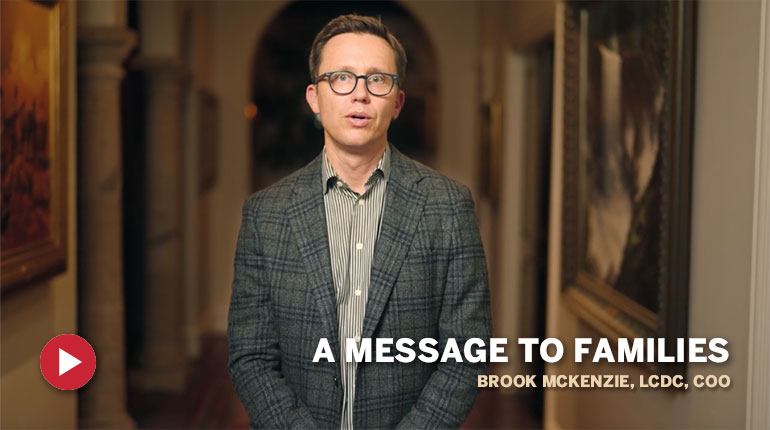
True Stories from Burning Tree Alumni
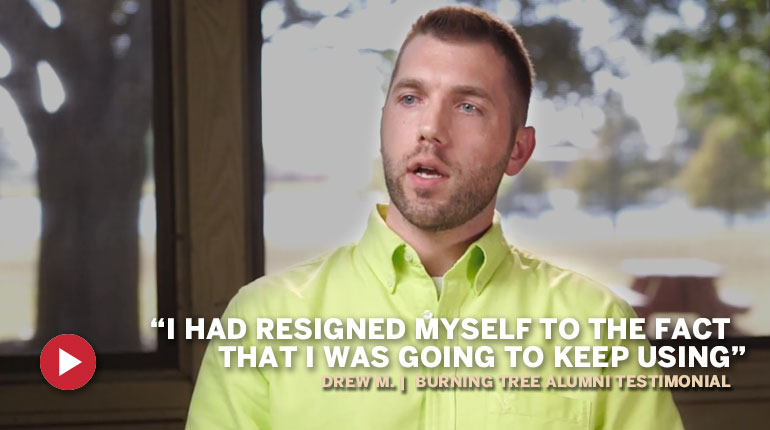
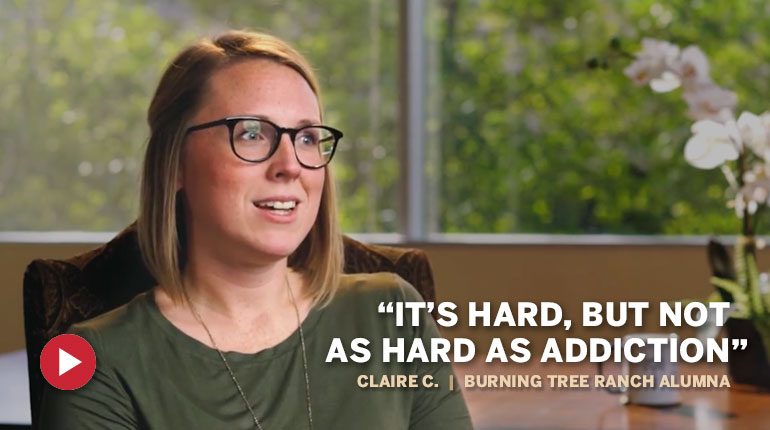
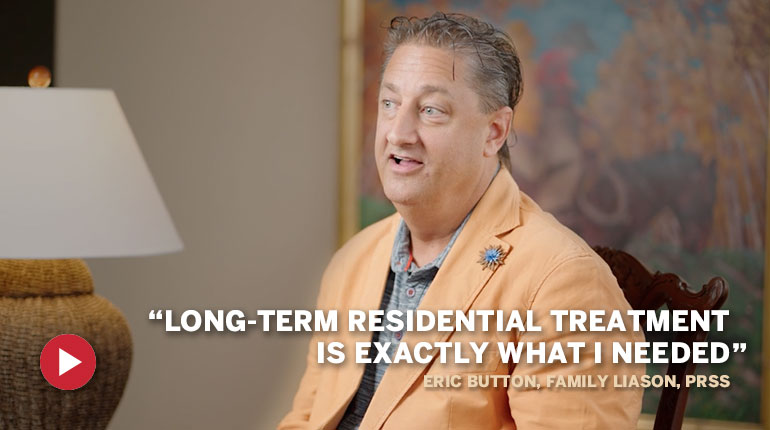
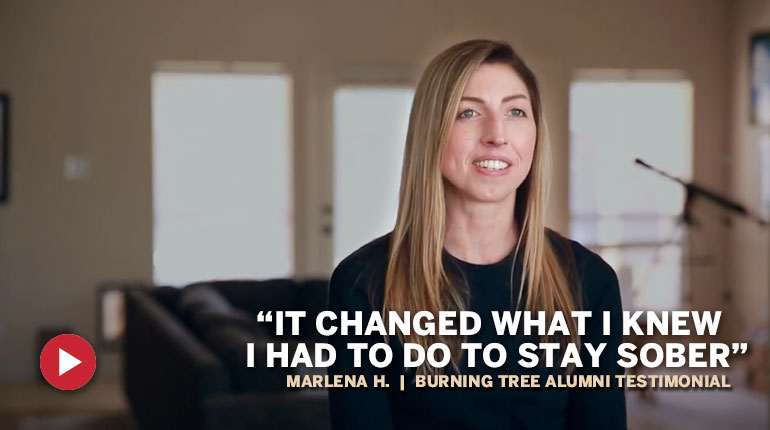
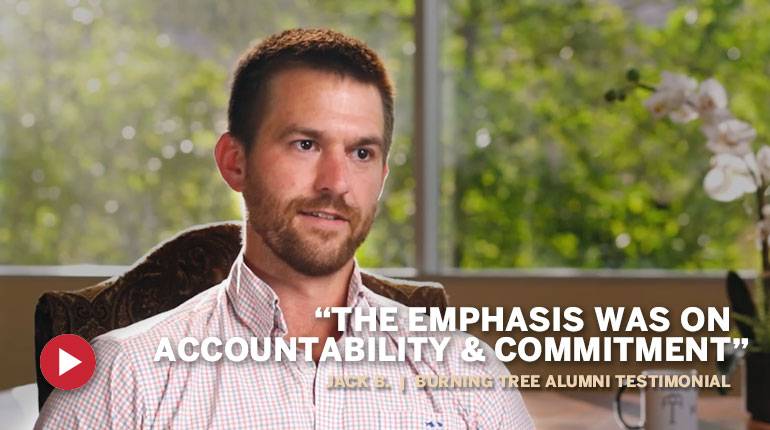

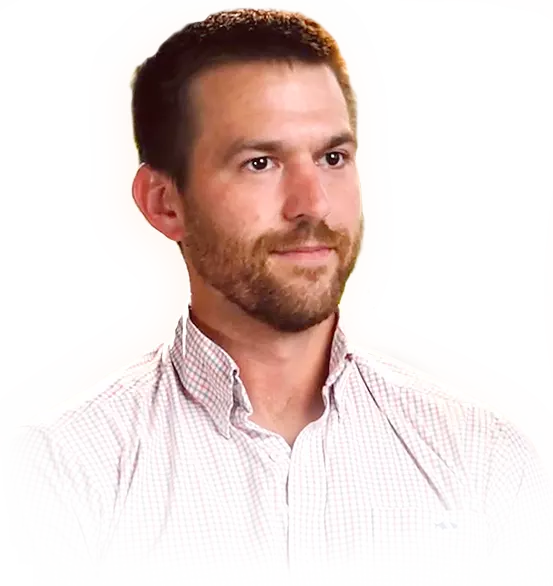
"It was as much about life skills as it was about treatment."
~ BURNING TREE PROGRAMS ALUMNI
What Do Burning Tree Families Say?
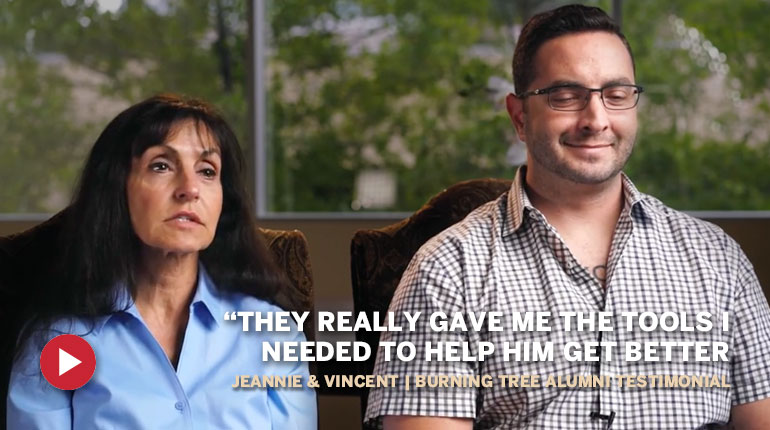
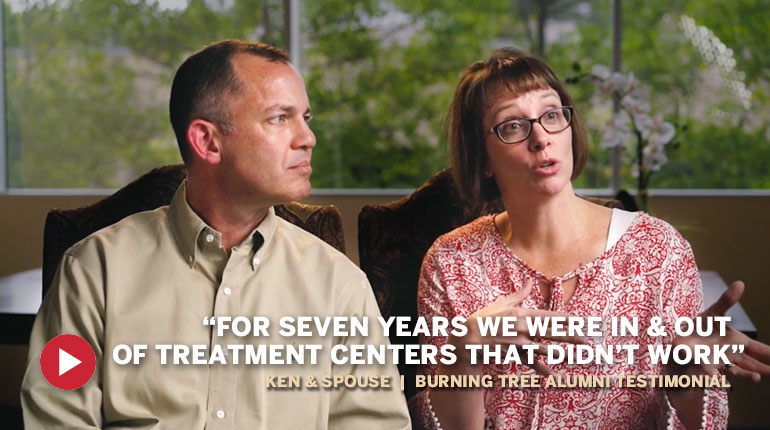
What Does it Mean to Undergo Long-Term Treatment?
Our families, like our clients, come to us broken. Having endured years of agony at the hands of a constant, unyielding addiction, Burning Tree Families are ready for something different.
- Focus On Identifying Complex Emotional And Mental Health Disorders
- Emphasis On Treating Advanced Stages of Addiction And Relapse
- Multi-Phased Long-Term Continuum Aimed At Permanent Recovery
- Concentration On Dynamic Behavioral, Attitudinal, and Personality Change
- Treatment Duration Informed By Measurable, Provable Progress - Not Time
Letters to Families: Read First-Hand Accounts Of Recovery
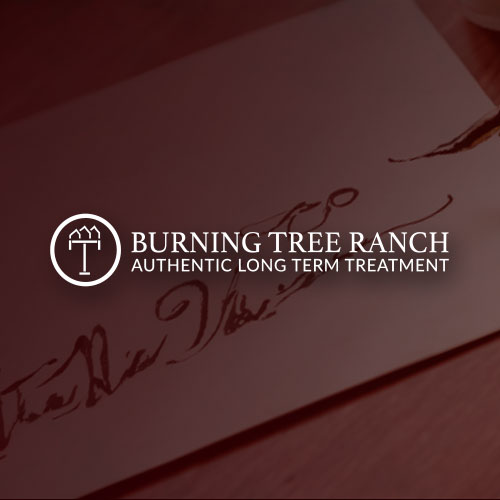
A Letter for Families From Our Clinical Director Meghan Bohlman
Dear Families, I often meet you after the whirlwind that ends with your loved one arriving at Burning Tree Ranch. I meet you in the space between relief that your loved one made it into long term treatment and fear that they won’t stay long enough to accept the help being offered. It is in this space that our treatment team will begin construction of something new with you.

A Letter for Families from Lisa M., Mother of an Alumnus
Dear Families, When I started this letter for Burning Tree families I thought about what I would have wanted to hear when I was at the point you are at now. What words of wisdom could someone give me? It wasn’t more addiction horror stories; you’ve experienced that firsthand.

A Letter for Families from Alumna Caroline D
Dear Families, My name is Caroline, and I am a recovering alcoholic. My sobriety date is May 21, 2015. Here is my story.

A Letter for Families from Elisabeth, Spouse of Burning Tree Alumnus
Dear Families, I once heard a speaker talk about sitting in front of the ocean and trying to stop the waves from crashing on the shore – that this is what powerlessness felt like. While the speaker was talking about their drinking and powerlessness over alcohol, I could relate to what he was saying.
Dear Families,
When I started this letter for Burning Tree families I thought about what I would have wanted to hear when I was at the point you are at now. What words of wisdom could someone give me? It wasn’t more addiction horror stories; you’ve experienced that firsthand. My son and I had some harrowing ones and I look back and wonder how we made it through those seven years of setbacks, heartbreaks, and craziness. I assure you it was as bad as it gets; multiple stints in jail, stealing, homelessness and life-threatening injuries and infections. I was willing to do anything to save him without realizing my willingness, my determination, even my love left me open to manipulation and failure. I had to empower myself.
I knew if we continued down this path there were only two endings, long-term incarceration, or death. So I changed my expectations from “fixing” it to just keeping him alive long enough to choose recovery. I gave up trying to make his life normal by keeping him part of family gatherings and talking about going back to school or a new career hoping he would see how great life could be and quit. Yes quit, like it was that easy. I gave up keeping him fed and sheltered. I gave up looking for him when he was homeless and running around like a crazy person fixing his messes, including paying off his debts to preserve his credit rating as if that was the greatest problem he was facing. I committed to keeping him in my life but with boundaries. No more bringing him back to stay at my house, no more money or food or bailing him out of jail but always letting him know I would be there in an instant if he decided to get clean.
I have an MBA, run an $80 million company, been through 4 back surgeries only to become a yoga instructor and I had to finally admit I couldn’t do this; I couldn’t fix his addiction. That one choice, that one decision was critical in leading us to Burning Tree and, even more importantly, sticking to that choice was the difference between success and failure in the program.
I had to stop being what I thought was the best parent. That manual, the one none of us ever received when they were born, if it existed and it had a chapter on addiction it would be one sentence…. forget everything you just read about being a good parent. To do what’s best for an addict you have to resist the urge to take care of them, believe what they tell you and give them second, third and fourteenth chances. I never stopped loving him, I never gave up hope and believe it or not I never got angry at him. I held on to who I knew he was but had to be realistic about who the drugs had turned him into. I could no longer deal with him based on the son I had known and loved. I learned to hate addiction.
I realized I was fighting a broken system, in hopes of saving a broken soul, in the midst of a family that was breaking apart and that made me angry.
If love and determination alone could save him, I assure you he wouldn’t have needed anything else. I had both in spades. I had to change course as I reached my breaking point. I had to choose to empower myself to save him. That is my best advice to you. Instead of feeling helpless and allowing yourself to be manipulated, take control. If you’re reading this letter, you are at the end of your rope.
If your family member is at Burning Tree what you’ve done in the past hasn’t worked. Hand over the wheel to the people that know what works. Play by the rules the staff set and begin to hold your loved one accountable. There is no one better than a recovering addict/alcoholic to see through the bullshit of another addict/alcoholic.
They have entered a place where there is no place to hide so don’t you give them one outside of Burning Tree Ranch. The staff are not being cruel or mean by insisting on routine, and hard work, sweat and yes lots of tears. Allow them to be confronted and to confront themselves. Allow yourself to be realistic about this devastating disease and allow Burning Tree to assist you in finally being part of the solution. Let go, your loved one is the right place, this is not your problem alone to solve anymore but you are a critical part of the solution.
What can you do? Be supportive, believe what the staff is telling you and follow their guidance. They are a thousand percent invested in guiding them to recovery and they know what it takes to get there because most of them have been there. Listen to your loved one but don’t try to fix it. Show up for visitation and take the weekly phone calls. What you say, don’t say, do and don’t do can be the difference between recovery and another relapse. Be their lifeline but for once in a healing, helpful way. Take advantage of them being safe and take care of yourself. Attend AL ANON meetings, take a vacation, rest easy. My hope for you is that you are at the beginning of the end of this nightmare. You have committed financially, emotionally and you can help end this. You have paid your dues and it’s time for the pay off.
Gerad has been clean and sober for over 3 years, and I am in awe of him. He chose life, he chose to put in the work and give in to something bigger than himself and most importantly he keeps doing the work and so do I. Stay the course that Burning Tree has put them on; support them staying for aftercare and you can get your loved one back and just as important get your own life back. It takes a lot of love and a lot of grace to survive this and come out the other side. You’re on the right path. Stay the course.
~Lisa M.
Dear Families,
My name is Caroline, and I am a recovering alcoholic. My sobriety date is May 21, 2015. Here is my story:
Before Burning Tree, I attended several different 30-day treatment centers, only to relapse shortly after I was discharged. I was living in Dallas and had been asked to leave my fourth sober living home due to my repeated relapses. My house manager in sober living would breathalyze me and the other residents, then I would sneak upstairs to my room and chug the alcohol I had smuggled in before blacking out. This happened every night for a while before I was “caught.” In May of 2015, I ended up homeless and drinking myself to death. I had several ER trips due to alcohol poisoning.
Multiple doctors told me that I should not be alive, and at this point I started to believe them – but could not stop drinking. My days centered around how I was going to get my alcohol, and how fast I could get black out drunk in hopes of temporarily forgetting where my life had come to. My alcohol and Adderall addiction left my life completely empty, meaningless, and to the point where I honestly did not want to live anymore. Lies spewed out of my mouth constantly,
and at this point I convinced myself my lies were the truth.
The delusion and desperate state of my addiction led to a dark version of myself I did not even recognize anymore. My parents, sisters and all family members and friends had completely cut me out of their life by the time I was 26 years old. I needed to change something in order to live.
I arrived at Burning Tree desperate for a better, different way to live. The life I was living was no life at all, I just could not grasp how I would ever live without alcohol.
Fast forward 6 months while I was at the Ranch, and I can still clearly recall the day I realized I had not thought about alcohol. I was working the twelve steps, seeking to mend my relationships, and tried to take baby steps forward in the right direction. Let me be clear, I struggled hard throughout my time at Burning Tree. I was blessed with numerous therapeutic interventions, and close to being asked to leave more than once. But the treatment team had enough grace – and a glimpse of my willingness – to allow me to stay.
After completing inpatient treatment at Burning Tree, I entered their women’s sober living home and aftercare program in Dallas.
Today, I am proud to say that I successfully completed all phases of treatment at Burning Tree and graduated in August of 2016. I am so thankful to the Burning Tree staff and my peers for their love towards me. I honestly believe it is a huge reason I was successful in getting and staying sober. There is no doubt that it is exactly what I needed at the time. It allowed me the space and time to heal, recover, and become the woman I am today.
As of this letter, I am over six years sober and try to tell my story every chance I get. In 2019, I got married to my best friend who is also in recovery with multiple years sober. In 2020, we welcomed our baby girl Emma who is now 18 months old. We are currently pregnant with baby #2 on the way.
My relationship with my parents and family has been totally transformed. I live a few miles from them and get to be the daughter I always wanted to be. I am true to my word and can honestly say my family trusts me 100% today. The start of the healing process began with my amends to my family while I was inpatient, and the family program process was hugely
helpful. I say all this to try to portray a small glimpse of the abundant blessings in my life since I got sober.
Pre-Burning Tree truly feels like a different lifetime ago but getting to share my story and help others keeps me grounded. In sobriety I have faced some tough circumstances, loss, and many difficult circumstances. Fortunately, the tools I was provided at Burning Tree have equipped me to face anything in life. Forever thankful for Burning Tree and my sobriety.
Sincerely,
~ Caroline D.
Dear Families,
I once heard a speaker talk about sitting in front of the ocean and trying to stop the waves from crashing on the shore – that this is what powerlessness felt like.
While the speaker was talking about their drinking and powerlessness over alcohol, I could relate to what he was saying. I was powerless over someone else’s drinking, and while I tried so hard to stop them, the waves kept coming and coming, no matter what I did or how hard I tried. It was only when I gave up trying to be the solution, trying to be their solution, that things changed.
They say the things you focus on become your higher power. My husband and his disease was my higher power.
I was addicted to fixing him – if only he would stop drinking I would be OK, everything would be OK. I was vigilant – watching his every move and behavior – so attuned to his drinking that I knew what to expect of him simply by the level of liquid in the bottle. I tried everything to get him sober and in my heart, I knew I could find the right words to get him to stop drinking so I talked to him all the time. Enabling, manipulating, bargaining, judgment, rescuing, punishment, retaliation – this was the language of our relationship.
My life was solely focused on getting him to stop and the misery of what it was like when he kept drinking. I took responsibility for his drinking: “If I were smarter, prettier, more successful he wouldn’t drink.” I judged and condemned him for his drinking: “He’s the one with the problem and if he’d just get it together we would be fine”. We were both lost in his alcoholism.
The more I tried to fix him the farther away that possibility became. The more afraid I was to lose him, the farther gone he was. I often wondered where we had gone – the two people with so much hope and promise that were standing at the altar the day we got married – they were lost.
My strength and hope was in Alanon. There I learned that I didn’t cause it, I can’t control it and I can’t cure it. I learned that the disease is a family disease and often the behavior of the non-drinker is crazier than the behavior of the drinker (while I didn’t like the idea, it was true in my case). I learned to separate the disease of alcoholism from the person so that I could hate the disease, but love the person.
I learned that I could love, understand, encourage and support without enabling. I learned that I wasn’t alone. I connected with a higher power. In reading Al Anon literature and the big book, I found us, my husband and me, among the pages of those books. I listened to open AA speakers and learned compassion born of understanding. And I learned that I was not equipped to help my husband – that I couldn’t make him stop drinking and that his recovery was his business and my recovery was mine.
By the time he reached Burning Tree Ranch, we were both in a state of surrender. I had given up – I knew that I couldn’t fix him, but I also knew that I couldn’t bear to see him suffer.
I laid down my sword and followed the direction of the Burning Tree staff – it was a Step 3 moment. I was relieved that he was safe, but knew that the work he had to do was his work, not mine and left him to the process, the counselors and experts at Burning Tree.
I respected the rules and did what was asked of me.
I knew that I had already lost him and it was only in surrendering him to the Burning Tree program that we had a chance of coming together again. When he embarked on his journey at BTR, we had been married 13 years. We are about to celebrate our 31st anniversary.
Burning Tree Ranch gave us a new start – when he graduated, we became newlyweds – starting our life together over. It was strange at first, almost like we had never met even thought we had been married for well over a decade, but BTR and the programs of Alcoholics Anonymous and Al-Anon gave us the tools and language to (re)build our life together – grounded in recovery and speaking the language of the heart.
With gratitude,
~ Elisabeth K.
Dear Families,
I often meet you after the whirlwind that ends with your loved one arriving at Burning Tree Ranch. I meet you in the space between relief that your loved one made it into long term treatment and fear that they won’t stay long enough to accept the help being offered. It is in this space that our treatment team will begin construction of something new with you. But remember – new construction takes time and growth is sometimes painful.
We talk with our families at length about how time is one of our greatest gifts at Burning Tree Ranch.
We know that 30-, 60- and 90-day treatments have not worked for our clients. If it did they would have been sober already. While there are people who can get sober in those facilities, our clients just aren’t those people.
When working with families, I often reference this odd form of amnesia that possesses the alcoholic and addict. It is baffling to watch someone be so desperate and distraught after burning it all to the ground and then, sometimes within days, be equally as convicted that they can control it, or it wasn’t that bad. I see families have this same amnesia.
Families share the same desperation when trying to get their loved ones to treatment. They become equally as convinced that the client is doing well despite a professional clinical team stating otherwise. The client will begin to look better physically, begin to sound better and start to believe that maybe 6 months is long enough. Families will start to question if Aftercare is really that important despite their loved one’s history of doing well in all those other treatment centers only to relapse a short while later.
Early on we begin to talk with families about their participation in the disease and most will, without fail, provide assurances that they are committed to doing what we ask of them. Then, as the client begins to have feelings, to be held accountable, and as their disease begins to ramp up, we will hear families start to defend their loved one, to ask for exceptions; some even begin to question the processes and approaches we have here.
At Burning Tree Ranch, we will ask that you begin participating in treatment the way we believe you need to. We are going to ask that you trust the process and follow the direction of the treatment team. We are going to ask that you attend a series of activities like a Family Workshop, Family Program, etc. and begin participating in Al-Anon. We will begin to confront ineffective family dynamics in real time, even if they are uncomfortable for you. We view this as a life and death errand and frankly, we are okay with you and your loved one being uncomfortable.
What we know to be true is that you love your addict/alcoholic. What we also know to be true is that the disease of addiction takes love and uses it as a weapon. Sadly, we have seen many families literally love their addict/alcoholic to death. At Burning Tree Ranch, we are going to ask that you let go of your control, hand us the reins and follow direction. This will be difficult at times. There will be moments when you may not want to do what we are asking you to do. But even when it’s hard, we are going to ask that you support our process – and do it anyway.
We aren’t for everyone and we understand that, but, we do have a way – and it is a way that works.
Sincerely,
Meghan Bohlman, LPC, LCDC, EMDR Trained
Clinical Director – Burning Tree Ranch
An Interview with Penny Bauder
When people are trapped in a severe addiction it can feel like there is no way out and there is no hope for a better future. This is of course not true. Millions of people are in recovery from an addiction and they go on to lead successful, fulfilling and inspiring lives.
Authority Magazine started a new series about women who were able to achieve great success after recovering from an addiction. The premise of the series is to offer hope and inspiration to people who feel trapped in similar circumstances.
As a part of this series we had the pleasure to interview Olivia Wilder. Olivia Wilder serves as Director of Admissions for Burning Tree Programs, and is responsible for helping execute the organization’s vision of excellence, Olivia leads a talented team of admissions specialists dedicated to Burning Tree’s philosophy of “creating a life of excellence beyond sobriety.”
Olivia serves as the chief clinical liaison between families/clients and the executive & clinical director of each of Burning Tree’s 3 programs. Not only is she a leader within the Burning Tree organization, she has been sober since 2014 and is a proud alumna of Burning Tree Ranch. Trained in multiple intervention disciplines, Olivia utilizes mindfulness, DBT skills, and a solutions-focused approach to help achieve dynamic results on behalf of the…
Highly Rated and Reviewed
Written Testimonials from Program Alumni
Featured In Top Publications











